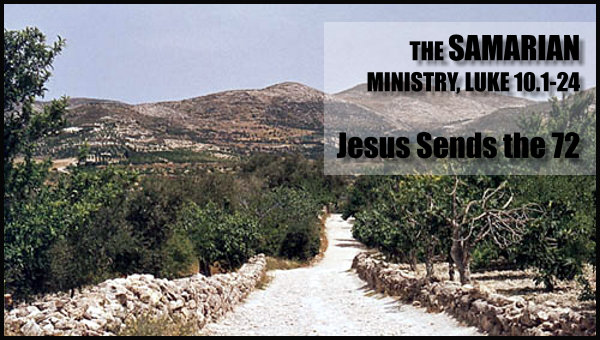By Tyson Thorne

The Samarian Ministry at Various Cities (9.51-18.34), 10.0-10.24
Since the sending out of the 12 worked so well in the last chapter, Jesus decides to send out the 72 (his “second string” of disciples, if you will) for the same mission. There is an important difference between the two, however. The 12 were sent to various Jewish villages around the Sea of Galilee but his mission is Samaritan villages. They were given the same instructions as the apostles and went ahead to several towns Jesus would visit himself. They were to proclaim that the Kingdom of God was near and prove their message through healing and casting out unclean spirits.
Some have taken issue with the message that Jesus and the disciples taught, that the Kingdom was near, arguing that after 2,000 years the Kingdom appears to be no nearer than it was then. But the message wasn’t about the timing of the Kingdom, rather its local. Jesus, as the rightful King, was present and he brought with him the authority of the Kingdom which was proven by the miracles performed by himself and his followers. On this occasion, however, Jesus issues a series of woes against three cities. Surprisingly, all three cities are in Galilee meaning all three are Jewish cities, not Samaritan. The judgments Jesus spoke against these cities was severe due of their lack of faith; more severe than even the punishments against Tyre and Sidon. What punishment did these ancient cities receive then?
Tyre and Sidon, geographically near each other, were cities as early as the time of Joshua but grew and became a region of great importance by the time of King David. It exported precious metals, purple dyes and cedar, and had a magnificent fleet which may have been the first to circumnavigate the African continent. Ezra prophesied the doom of Tyre, and while its location made it nearly impossible to invade it did eventually fall to the Babylonians. It became a desolate place, its ancient harbors used today to dry fishing nets, just as Ezra predicted. Sidon fell first to the Assyrians and Tyre later to the Babylonians. While these great cities remained inhabited even into the time of Paul’s missionary journeys they never regained their prominence and were abandoned later.
What then is the significance of Jesus’ judgment? Tyre and Sidon were examples of gross idol worship and materialism (think Las Vegas) throughout the Old Testament and would have been familiar to the Samaritans. Jesus’ point was that even these ancient examples of sinfulness would have responded to his message, unlike the Jewish cites of Chorazin, Bethsaida and Capernaum. The Jewish city’s received the blessing of receiving the Messiah and rejected him, justifying the most extreme judgment.
When the 72 returned, like the 12 apostles, they were joyous and excited about the work they were able to do. What amazed them most is that even demons obeyed them when exorcised. Jesus uses this as a teaching moment and Luke tells us more of what Jesus said on this occasion than the other gospel writers. Interestingly, while Jesus had only told the disciples that he was the Messiah, he tips his hand here to the rest of his followers. He did so when he said, “I saw Satan fall like lightening from heaven”. Some have suggested this event took place during the mission of the 72, but it is more likely he is recounting the event from long ago. Why mention this event at all? It seems curious given the context, unless Jesus is referring to authority.
The question of Stan’s creation and fall will have to wait for another time, as it’s far too cumbersome to address here. What we can say is that Stan was at some time given authority over the earth (perhaps before his fall?) as is indicated earlier in Luke 4.5-7 during Jesus’s temptation. Satan claims to have authority over all the kingdoms of the earth, and Jesus does not dispute this claim. In fact, Jesus’ presence on earth challenges that authority but does not as yet usurp it (Jesus will claim all authority following the resurrection). If it is the issue of authority Jesus is referring to, it fits nicely with the rest of what he teaches the 72: “Look I have given you authority to tread on snakes and scorpions and on the full force of the enemy, and nothing will hurt you.” It should be noted that this authority is clearly given to the disciples, and is not normative of the Christian experience. The authority which Jesus gives, while remarkable, is not the greatest thing Jesus has given them. That gift is eternal life, which Jesus explains thusly: Do not rejoice in this authority I have given you, but rather “rejoice that your names stand written in heaven” in the Book of Life.
Getting back on topic, Jesus is revealing to these men that he is in fact the Messiah, and more. He was present when Satan fell, he has the ability to give authority to his followers over both the natural and supernatural world, and he prays to the Lord as his “father”, stating that he is in fact the Son who knows the Lord intimately and the Lord knows him likewise. His coming was known to those of old and how they wished to see that day, which those present are seeing unfold before their eyes. Is there any greater wonder than God becoming man to rescue his people from subjection to Satan?
|
|